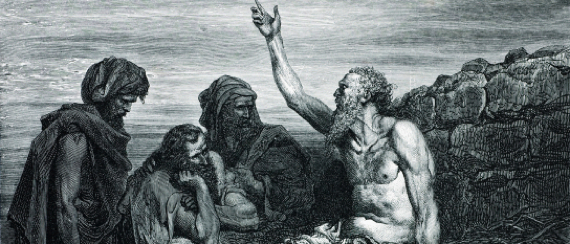
Today’s entry was written by Kathryn Applegate. Applegate is completing her PhD in Cell Biology at The Scripps Research Institute.
Genetic switches that act during development to produce a newborn baby seem, like Michael Behe’s mouse trap, irreducibly complex. As Darrel Falk pointed out recently, however, irreducibly complex switches also drive the proliferation of bacteria and viruses which kill millions of people each year. Christians must wrestle with a difficult question: is God responsible for designing these killing machines?
Falk says no–evil in the world is a by-product of the freedom God has given his creation. According to Christian theology, Satan is not a co-creator with God, so we cannot attribute to him the existence of harmful microorganisms. But to say that God hand-crafted each irreducibly complex structure in a virus would seem to make him the author of evil. Falk argues that God’s creation has freedom built into it, such that natural selection produces both darling babies and deadly bugs.
Bill Dembski, a prominent figure in the Intelligent Design movement, responded to Falk’s piece with a post of his own. He argues against trying to absolve God of specially creating bad designs: “for the Christian it does nothing to resolve the problem of evil by passing the buck to a naturalistic evolutionary process (a process, in that case, created by God).” In his eyes, whether God creates “directly by intervening or indirectly by evolution,” God is responsible, just as a mugger is responsible whether he uses his own hands or a vicious dog to assault his victim.
This week Karl Giberson countered Dembski, contending that Christians have always shifted the responsibility away from God when it comes to the problem of evil. He reiterates the need to invoke human freedom by reminding us of the Holocaust: “The freedom God gave humans was exercised most effectively in the construction of gas chambers at Aushwitz and Dachau. But, because humans have freedom, we do not say that God created those gas chambers. God is, so to speak, off the hook for that evil.”
The belief in a good and sovereign God seems to be at odds with the realities of death, disease, and evil we experience in this life. This apparent paradox exists at least in part because of our near-sighted view of God’s purposes for suffering. Consider the this familiar verse, Romans 8:28: “And we know that in all things God works for the good of those who love him, who have been called according to his purpose” (emphasis added). God always works to bring good out of human suffering, whether that suffering is caused by people or by nature.
The story of Joseph in the Old Testament illustrates how human evil can be used for good. Years after Joseph’s brothers beat him and sold him into slavery, he saves them from starvation during a famine. Upon realizing who Joseph is, they fall down before him in fear, but he reassures them, saying, “You intended to harm me, but God intended it for good to accomplish what is now being done, the saving of many lives” (Genesis 50:20).
On multiple occasions, Jesus affirms that physical suffering is neither meaningless nor necessarily the result of sin, but an opportunity for God’s glory to be revealed. In John 9, Jesus heals a man blind from birth. His disciples ask whose sin caused the man’s blindness, and Jesus tells them, “Neither this man nor his parents sinned…but this happened so that the work of God might be displayed in his life.” In Luke 13, Jesus asserts that a terrible tragedy is not punishment for sin but a wakeup call: “…those eighteen who died when the tower in Siloam fell on them–do you think they were more guilty than all the others living in Jerusalem? I tell you, no! But unless you repent, you too will all perish.”
Surely the best example of God using evil for good can be seen in the death and resurrection of Christ. We don’t like to think that God actively willed the murder of his own son, but from the earliest chapters of the Bible we see God’s promise of redemption from sin (Genesis 3:15). Indeed, the sacrificial system of the Old Testament, considered primitive and bloody by our culture today, pointed forward to the atoning work of Christ. Thus our greatest blessing as Christians–the promise of salvation–came through a horrific act of violence.
In Isaiah 45:7 God says, “I form light and create darkness, I make well-being and create calamity, I am the Lord, who does all these things.” It is alarming to realize that God is not as predictable as we might expect. He is completely and utterly sovereign; he does whatever he pleases (Psalm 115:3). This would be terrifying if God weren’t also good. Even in his goodness, though, he does not prevent us from doing evil or experiencing suffering. That is why Falk and Giberson are right to emphasize man’s and nature’s freedom. In Mere Christianity, C.S. Lewis writes:
If a thing is free to be good it is also free to be bad. And free will is what has made evil possible. Why, then, did God give them free will? Because free will, though it makes evil possible, is also the only thing that makes possible any love or goodness or joy worth having. A world of automata–of creatures that worked like machines–would hardly be worth creating. The happiness which God designs for His higher creatures is the happiness of being freely, voluntarily united to Him and to each other…
God’s sovereignty and nature’s freedom will forever be in tension. But we can keep testing our assumptions and looking at the evidence on various topics like evolution. The conclusions we come to may be different, depending on our theological and philosophical positions and our differing levels of scientific knowledge. That’s fine, as long as we keep seeking truth and acting in humility and love. Personally, I find the evidence for evolution of all living things by natural selection extremely compelling. Yet my understanding of nature would be grossly impoverished without the rich depths of truth found in Scripture. I am grateful for forums like this where both scientific and theological truths are sought after and celebrated.

